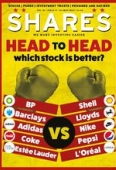Archived article
Please note that tax, investment, pension and ISA rules can change and the information and any views contained in this article may now be inaccurate.
Could the sustained rise in food prices become a political issue?

In the words of Paul Donovan, UBS’s chief economist who is not known for mincing his words, like Fight Club, the first rule of price gouging is you do not talk about price gouging.
‘The profit-led inflation story has been fueled by corporate results showing profit-led inflation. As these stories move from the financial press to social media, companies must weigh whether short-term margin expansion compensates for the risk of customer resentment at paying higher prices,’ says Donovan.
UK food-price inflation was more than 17% in the four weeks to mid-April, according to grocery market data from Kantar, making it 10 months in a row that prices have risen by 10% or more.
According to the ONS (Office for National Statistics), food and non-alcoholic beverage prices rose even faster in March, with inflation hitting 19.2%, up from 18.2% the previous month, the highest rate in 45 years.
The ONS data shows the price of basic food stuffs soaring in March, with bread and cereal prices up nearly 20%, pork prices up 25% and milk, cheese and egg prices up a shocking 30%.
Consumers are doing the best they can, saving money every way possible, from trading down in terms of where they shop to buying cheaper products and using loyalty schemes.
Discount retailer Aldi reached a landmark last month, taking a 10% share of the UK grocery market for the very first time – two years ago its share was just 8% and five years ago it was little more than 5%.
Between them, Aldi and Lidl now account for 17.7% of UK grocery till receipts or more than £1 in every £6 we spend.
As well as using discounters, shoppers are managing their budgets by buying own-label products, with sales up 13.5% in the 12 weeks
to mid-March and sales of the cheapest ‘value’ own-label lines soaring by 46% on the same period last year.
Normally the cure for high prices is high prices, but consumers aren’t able to turn the tables on food and drink companies by not eating.
In France, finance minister Bruno Le Maire has strong-armed the retailers into capping many food prices to ‘the lowest possible level’ until mid-year making the April to June quarter ‘anti-inflationary’.
A similar strategy in the UK seems unlikely given the Government’s political hue, but a senior official at the Bank of England has already warned companies they need to accept lower margins to avoid persistent inflation.
Maybe, as Donovan suggests, this is the point where consumers step up on social media to name and shame companies into cutting prices, or at least holding off from further raising prices.
Important information:
These articles are provided by Shares magazine which is published by AJ Bell Media, a part of AJ Bell. Shares is not written by AJ Bell.
Shares is provided for your general information and use and is not a personal recommendation to invest. It is not intended to be relied upon by you in making or not making any investment decisions. The investments referred to in these articles will not be suitable for all investors. If in doubt please seek appropriate independent financial advice.
Investors acting on the information in these articles do so at their own risk and AJ Bell Media and its staff do not accept liability for losses suffered by investors as a result of their investment decisions.
Issue contents
Case study
Feature
Great Ideas
News
- Cloud computing, not artificial intelligence, is what’s really driving big tech earnings
- HSBC shares leap as profits triple and firm announces $2 billion buyback
- Meta Platforms’ shares continue to soar on AI hype and cost cuts
- Shares in Ocado are down 44% in 12 months as the company closes key facility
- Could the sustained rise in food prices become a political issue?

 magazine
magazine








